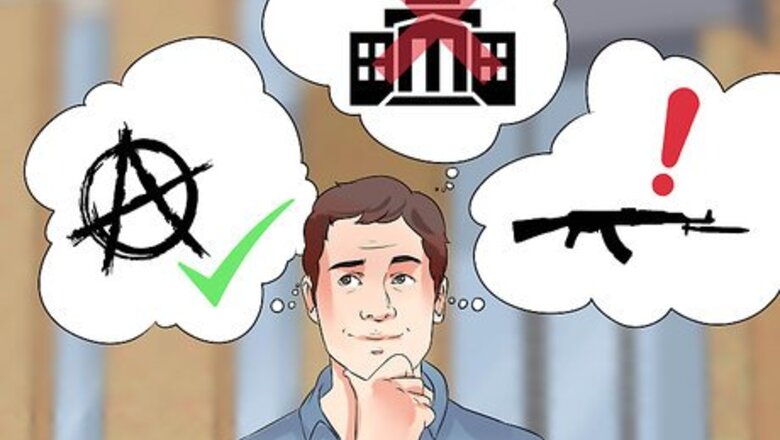
views
Anarchy Basics
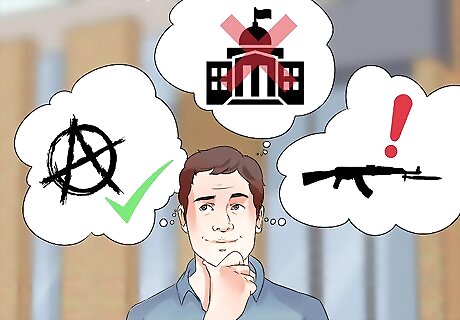
Decide whether or not you want to support anarchism, planned chaos and policies of reverting to less structured life, or to absolute "government" controls with block and union committees (tribalism). This means studying, researching, and learning about anarchism. Reading some basic introductions to anarchism is the first step. Familiarize yourself with the ideas of some of the other most important anarchist theorists and writers. Read 19th century anarchist writers like Pierre Joseph Proudhon, Peter Kropotkin (The Conquest of Bread), Daniel De Leon, Mikhail Bakunin (God and the State), Alexander Berkman (The ABC of Communist-Anarchism), Josiah Warren and Benjamin Tucker. Read 20th century writers such as Emma Goldman (Anarchism and other Essays), Errico Malatesta (Anarchy), Alfredo Bonanno, Bob Black, (The Abolition of Work), Wolfi Landstreicher (Willful Disobedience), John Zerzan, Murray Bookchin, Crimethinc. Ex-Workers Collective (Recipes for Disaster), Daniel Guerin (Anarchism: From Theory to Practice, No Gods No Masters: An Anthology of Anarchism), Rudolf Rocker (Anarcho-Syndicalism: Theory and Practice), Colin Ward (Anarchism: A Very Short Introduction), Noam Chomsky (Chomsky on Anarchism).

Read up on the different schools of thought. There are dozens of different anarchist schools like: libertarian socialism, anarcho-communism, anarcho-capitalism, individualist anarchism, minarchism (minimal government powers), syndicalism (labor unions administrate and manage production), platformism (non-centralized communism), post-left anarchism, mutualism, indigenism (living off the land), anarcha-feminism, green anarchism, and others.
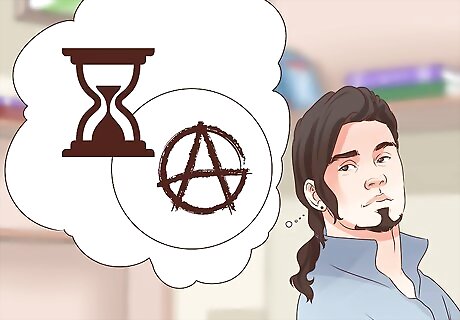
Familiarize yourself with the history of anarchism. Read about anarchist movements during the Spanish Revolution of 1936 (Orwell's Homage to Catalonia and Augustin Souchy's With the Peasants of Aragon are good starting points), the Makhnovist uprising in Ukraine, Paris in 1968, today's Black Blocs, and movement events such as WTO Seattle.
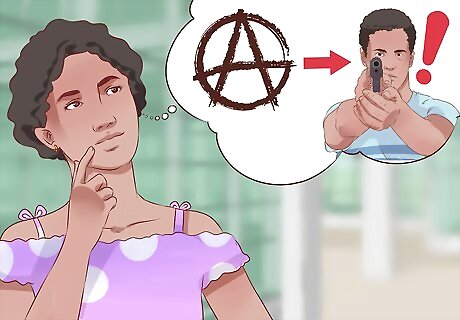
Understand and assess the negative connotations of anarchy. Take what you've learned about anarchism to reflect on those negative connotations. There are many negative stereotypes about anarchism. Many associate anarchism with violence, arson, and vandalism. Like with every system of thought, you will have to try to assess how people would create and enforce anarchism.
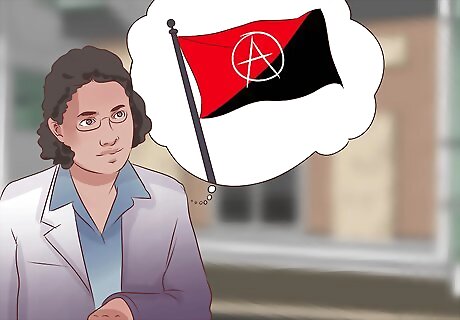
Familiarize yourself with the anarchists' symbols and flags. Like all political movements or social organizations, anarchists use symbols to identify themselves and their principles. These symbols vary based on place and have changed over time. The original “black flag” symbol emerged in the 1880s. Over one hundred years later, the circle “A” symbol became the predominant anarchist symbol. Others exist as well.

Learn about capitalism, Marxism, fascism, and other political ideologies. Know your “competition”. Know what is important in other systems of thought so you can emphasize how your viewpoint is preferable. Understand the arguments for government control, law and order. Know that statism is founded on the idea that human beings cannot effectively organize themselves on an egalitarian basis. They need a centralized state to defend against totalitarian governments, to police the populace to handle violence, gangs, and more generally to have law and morality and the systems of currency/money, trade and commerce/the economy in order to avoid war at international, national, state and local government levels, and group and individual conflict.

Take your time. You are developing a worldview. Don't rush into it because it is faddish or because you're bored. Carefully consider each thinker and each principle. What makes sense to you?
Lifestyle
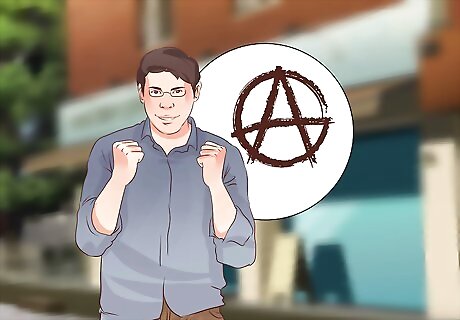
Start with yourself, by living as an individual in your way. Take control over your own life to the greatest degree possible. Nobody owns you, but you live in a society. No authority over you is legitimate unless you violate the rights of others or voluntarily grant the authority to others in work, play or community governance, just as you should not have authority over others, if they don't consent to it. Think about your own relationships. Do you have equal relationships with your friends, family members, loved ones, and co-workers? If you have power over them and they have not consented to it, find a way to remedy the situation. Talk to them about your anarchist beliefs. Let them be. Explain that you wish to create an egalitarian relationship.
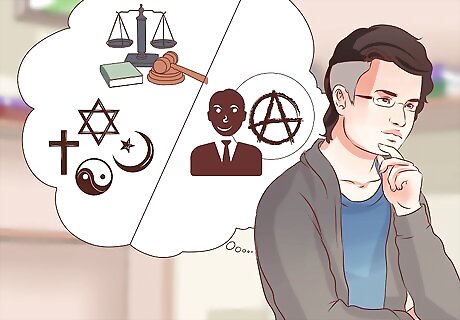
Consider your relationships with hierarchical authorities. Many anarchists have issues with the government, hierarchical religion, and large, regimented corporations. Think about your relationship to each one of these entities. Do you think that the government is too powerful? Do you think that the government intrudes on your life too much? Think about the steps you can take to reduce the government's presence in your own life. You can move to a new country where the government is less intrusive. You can go off the grid and evade the law. Or you can protest. See the following section. Many anarchists turn to atheism because they dislike the hierarchical structure of the church. Others choose to remain in their respective religions but reject this structure in favor of individual or small group meetings for worship. Some anarchists, particularly communists, collectivists, mutualists, and syndicalists, have a real problem working for corporations with several levels of managers. If this is you, consider quitting your job, unionizing and/or starting your own sole proprietorship type of business. Some even turn to collective farming.
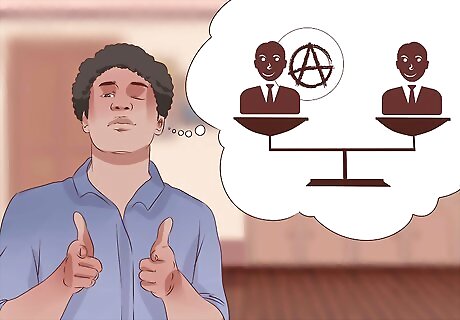
Promote equality but realize that without laws and their enforcement by a government that it would depend on individual choices. Think about gender equality, sexual equality, racial equality, religious equality, equal opportunity, and pay equality that all use force of law versus individual choices. Assist those who are unfairly treated by the "system". Promote choosing and being dedicated to working in related career areas to build knowledge, experience and skills to get promotions. For example, help promote rights to equal wages in a chosen career, help promote racial diversity. Challenge these opportunities and what they offer to society.
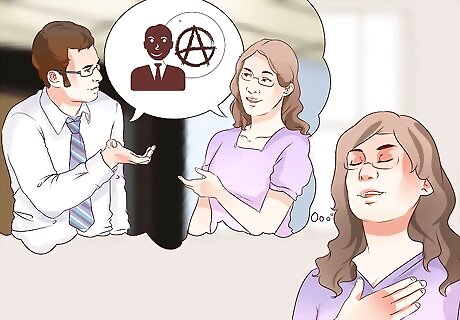
Find other people who share the same belief. Find a community of people who believe some of the same things you do and live in a small, informal network of friends. You will need to rely on others. This is unavoidable. You can learn from each other, teach one another, and expand the network. To the extreme, others who proclaim the complete fracture of governing framework, and use anarchy (such as extreme libertarianism) to take the opportunity to convince people to believe they can use their "liberty" to remove many drug laws. They can avoid family-structure/marriage, parenthood, child-raising/supervision of children and much of traditional government/policing. So, instead, a community, much like a cult, would take responsibility for children in a communal "orphanage" as wards/foster children of the "community"/local arm of the state for life.
Promoting Anarchy
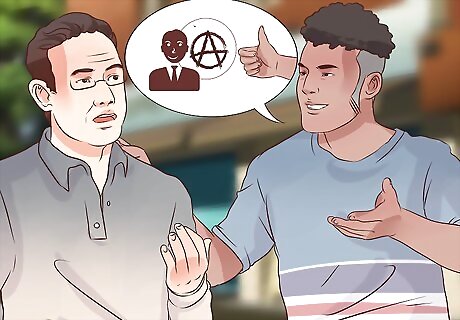
Learn to be persuasive. Spread the word. Stress what you have in common with those you speak to. You will be especially effective if your questions direct their answers toward your conclusions. Make sure they know that anarchism is not about chaos or smashing things, it is a political and social ideology that advocates self-organization and a non-hierarchical political and economic system rooted in Direct Democracy, Radical Democracy, or individualism depending on the type of anarchism.
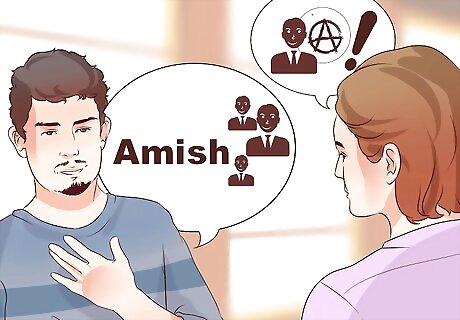
Prepare to respond to accusations. Accusations of utopianism with examples of anarchy in action, most indigenous societies throughout history have been anarchist and even today there are many intentional communities that operate along anarchist lines - not always in the places you'd expect. The Amish, for instance, are a great example of non-ideological Anarchism in action.
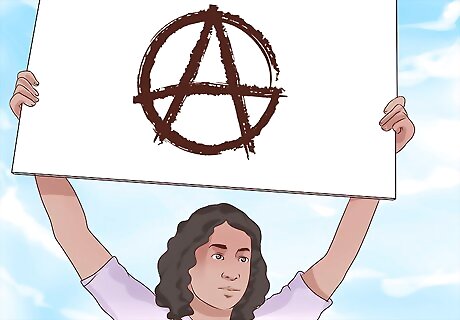
Participate in protests, direct action, and grassroots organizations. But remember, protest changes nothing if there is no movement behind it. That means long hours of community organizing, sitting through meetings, and working with people who you probably disagree with and may not even like. It's not easy but if you really want to spread your message, it is necessary. You will probably have to make a lot of cold calls, put up flyers, and set up booths at local events in order to gain people's attention. If you truly believe in spreading your philosophy, these are all necessary actions.
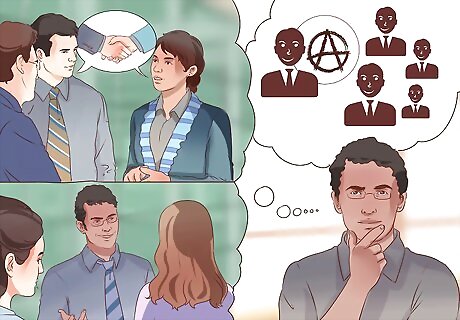
Organize anarchist events/meetings. Lead by example. There are a lot of local events led by anarchist groups around the world. They range from informal meet and greets to book fairs and concerts.
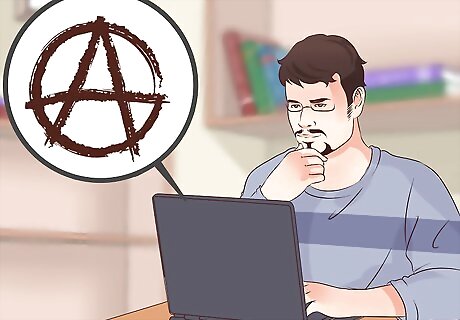
Use social media to spread the word. There are some anarchists who disagree with the use of social media as it tends to support big social media corporations, using alternative social media could be a good choice if this is the case. In our social media age, you can find other people with similar interests easily. Search your social media platforms (Facebook, Reddit, 4chan, 8chan, YouTube, Google+, Twitter, Tumblr, Instagram, Vine, Steam....etc.) for other like minded individuals. You can also help organize protests and other anarchist activities through social media. This is a great way to get free exposure for your movement.


















Comments
0 comment